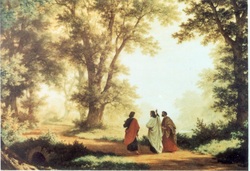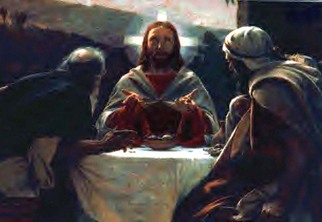
Sermon by St. Gregory the Pope
Ye have heard, dearly beloved, how that two of Jesus' disciples walked together in the way, not as yet believing in his resurrection, but at least talking together concerning him; and how that the Lord manifested himself unto them, even while he caused their eyes to be holden, so that they should not know him. Now this holding of the eyes of their body, wrought by the Lord, was an outward manifestation of the condition of the eyes of their heart. For in their heart they loved, yet doubted; and so the Lord drew near to them outwardly, yet shewed them not who he was. Thus, because they talked together of him, he manifested his presence unto them; but because they doubted, he hid the knowledge of his person from them.
Indeed, he took up what they were saying; he rebuked the dullness of their understanding; he expounded unto them in all the Scriptures the things concerning himself. Nevertheless, because he was not as yet present in their hearts by faith, he made as though he would have gone further. These words: He made as though: might here seem to índicate that he was feigning; but he who is the Truth itself doth nothing by duplicity. Wherefore, we should understand that he shewed himself to them in body, in such wise as they were able to perceive him in their souls; and they were thus given the opportunity to see whether they, who as yet loved him not as their God, could love him at least as a wayfarer.
But since it was impossible that they, with whom Truth walked, should be loveless, they were moved to ask him as a wayfarer to partake of their hospitality. But why should we use such a weak word as Ask? for it is written: And they constrained him. Doubtless we are to learn, from their example, that wayfarers are not only to be asked to partake of hospitality, but are even to be urged so to do. Whereupon they laid a table, and set before him bread and meat; and on this wise it came to pass that the God whom they had not known in the expounding of Holy Scripture, they knew in the breaking of the bread. Thus it was that, even though they gained no enlightenment in hearing him speak of God's commandments, yet in the doing of the same the eyes of their understanding were opened. As it is written: Not the hearers of the law before God, but the doers of the law shall be justified. Whosoever therefore would understand what he hath been taught, let him make haste to practise in his works so much as he hath already been able to grasp. For behold, the Lord was not known by them from his speaking to them, but from their breaking of bread with him.





